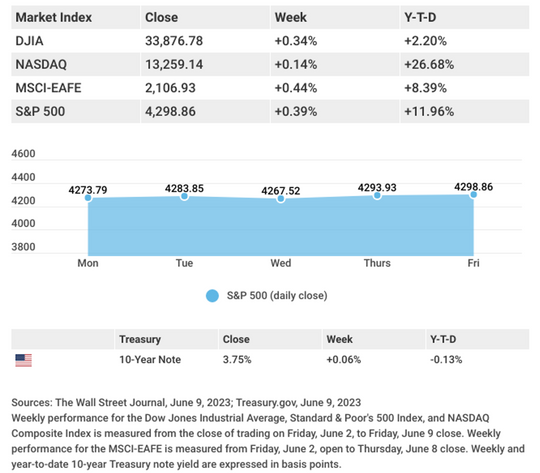
Weekly Market Insights – June 26, 2023
Weekly Market Insights: Stocks Take Summer Break, Month Remains Strong
Presented by Elsass Financial Group
|
Stocks took a breather last week as investors digested the previous week’s surge and the month-to-date solid gains. The Dow Jones Industrial Average lost 1.67%, while the Standard & Poor’s 500 fell 1.39%. The Nasdaq Composite index dropped 1.44% for the week. The MSCI EAFE index, which tracks developed overseas stock markets, tumbled 2.00%.1,2,3 |
 |
 |
Rally StallsThe stock market drifted lower last week as the tug-of-war between bulls and bears played out in a week that was light on market-moving news. After falling in the first days of a holiday-shortened trading week, stocks rebounded on Thursday to recover some of the week’s losses. Stocks looked past Congressional testimony by Fed Chair Powell, who said two more rate hikes are likely in the wake of interest rate hikes by central bankers in the U.K., Switzerland, Norway, and Turkey. The retreat continued into Friday, fueled by global growth fears from new economic data indicating more robust economic slowdowns in the eurozone, Japan, and Australia. Housing Sentiment ImprovesHome builders’ confidence edged into positive territory for the first time in 11 months, aided by strong demand, low inventory, and a recovering supply chain. May’s new home sales, which rose 21.7%–the most significant percentage gain since October 2016, validated this confidence. The number of new home starts in May (1.63 million) hit a 13-month high, with both single- and multi-family homes up substantially.4,5 Sales of existing homes in May rose 0.2% month-over-month while declining 20.4% from a year ago. The existing home market continues to suffer from low inventory and still-high prices. The median price of a home sold in May declined 3.1% year-over-year to $396,100.6 This Week: Key Economic DataTuesday: Durable Goods Orders. New Home Sales. Thursday: Gross Domestic Product (GDP). Jobless Claims. Friday: Personal Income and Outlays. Consumer Sentiment. Source: Econoday, June 23, 2023 This Week: Companies Reporting EarningsTuesday: Walgreens Boots Alliance, Inc. (WBA). Wednesday: Micron Technology, Inc. (MU), General Mills, Inc. (GIS). Thursday: Nike, Inc. (NKE), McCormick & Company, Inc. (MKC) Source: Zacks, June 23, 2023 |
 |
|
“There is no better compass than compassion.” – Amanda Gorman |
 |
Couples Who Work Together, Tax TogetherWhen a household starts a business, couples find themselves learning about the tax responsibilities related to that business. There are some things to consider when working together. Here are a few items to consider:
*This information is not intended to substitute for specific individualized tax advice. We suggest you discuss your specific tax issues with a qualified tax professional.
|
 |
Eat This, Not That: Easy Food Swaps Anyone Can DoEating healthier doesn’t have to be hard! You might not have to make any significant changes to your current diet! You can cut the bad stuff by swapping out unhealthy options for healthier picks and still enjoy your meal. Here are some of our favorite food swaps:
Many healthy swaps like these can help you reduce your caloric intake, consume less sugar, and make it easy to create a more balanced meal.
|
 |
|
You hold 3 U.S. coins in your hand. None of them are dimes, pennies, or quarters. They total 60¢. What 3 coins do you have in hand?
Last week’s riddle: A major league pitcher faces just 27 hitters in a baseball game. He retires all of them, allowing no runs and no hits. Still, his team loses the game 4-0. How is this possible? Answer: He was a relief pitcher. |
 |
 |
|
Lake Tekapo & Lupin Field, New Zealand |
Footnotes And Sources
2. The Wall Street Journal, June 23, 2023. 3. The Wall Street Journal, June 23, 2023. 4. National Association of Home Builders, June 19, 2023 5. Reuters, June 20, 2023. 6. CNBC, June 22, 2023. 7. IRS.gov, February 22, 2023 8. EatThis.com, February 15, 2023 |
|
Investing involves risks, and investment decisions should be based on your own goals, time horizon, and tolerance for risk. The return and principal value of investments will fluctuate as market conditions change. When sold, investments may be worth more or less than their original cost. The forecasts or forward-looking statements are based on assumptions, may not materialize, and are subject to revision without notice. The market indexes discussed are unmanaged, and generally, considered representative of their respective markets. Index performance is not indicative of the past performance of a particular investment. Indexes do not incur management fees, costs, and expenses. Individuals cannot directly invest in unmanaged indexes. Past performance does not guarantee future results. The Dow Jones Industrial Average is an unmanaged index that is generally considered representative of large-capitalization companies on the U.S. stock market. Nasdaq Composite is an index of the common stocks and similar securities listed on the NASDAQ stock market and is considered a broad indicator of the performance of technology and growth companies. The MSCI EAFE Index was created by Morgan Stanley Capital International (MSCI) and serves as a benchmark of the performance of major international equity markets, as represented by 21 major MSCI indexes from Europe, Australia, and Southeast Asia. The S&P 500 Composite Index is an unmanaged group of securities that are considered to be representative of the stock market in general. U.S. Treasury Notes are guaranteed by the federal government as to the timely payment of principal and interest. However, if you sell a Treasury Note prior to maturity, it may be worth more or less than the original price paid. Fixed income investments are subject to various risks including changes in interest rates, credit quality, inflation risk, market valuations, prepayments, corporate events, tax ramifications and other factors. International investments carry additional risks, which include differences in financial reporting standards, currency exchange rates, political risks unique to a specific country, foreign taxes and regulations, and the potential for illiquid markets. These factors may result in greater share price volatility. Please consult your financial professional for additional information. This content is developed from sources believed to be providing accurate information. The information in this material is not intended as tax or legal advice. Please consult legal or tax professionals for specific information regarding your individual situation. This material was developed and produced by FMG Suite to provide information on a topic that may be of interest. FMG is not affiliated with the named representative, financial professional, Registered Investment Advisor, Broker-Dealer, nor state- or SEC-registered investment advisory firm. The opinions expressed and material provided are for general information, and they should not be considered a solicitation for the purchase or sale of any security. Copyright 2023 FMG Suite. |







